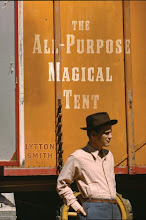Small publishers get an amazing boost from selling on Amazon, in that it gives them instant worldwide distribution. Amazon should be applauded for the ease with which they grant access to this network. Through what they call their Advantage programme, any publisher, no matter how tiny, can quickly get their books on Amazon. In other words, a publishing house cannot even exist one day and a few days later find their books for sale everywhere from the UK to the US, to China and beyond, through a company whose websites draw millions of hits each day.
However, there's a price for entering such a spectacular marketplace; one so steep that it could be argued that all the economic advantage goes to Amazon alone. The standard fee for small presses working through the Advantage programme is a staggering 55% of a book's cover price. In addition, publishers are also responsible for the cost of shipping their books to Amazon warehouses. This puts these publishers in the horrible position of having access to arguably the best book distribution system ever devised, while being charged so much for the privilege that it becomes difficult to impossible for them to make any money.
My interest in this is partly in how this has repercussions for (written) art. In one sense, the ways internet technology has opened up publishing should allow a diversity of aesthetics. Then again, the 1970s was a time of great diversity in publishing, helped in part by the advent of Xerox machines, but also largely through the use of familiar technologies such as letterpresses (hard now to get a hold off). Those of us who have poet-friends probably know at least one person with a well-received first book unable to get a second book published, and with small presses short on capital to increase their list size in order to take second or third books by poets they've committed to while also adding new poets to their roster.
This is part of a larger issue which requires much thought, but in the immediate future, I'd suggest that buying books directly from small presses is the solution. Many small presses offer discounts or free shipping: Four Way offers a 32% discount, comparable to Amazon's (the difference being that they, rather than Amazon, get 55%, and they're a non-profit); Omnidawn is offering Lyn Hejinian's Saga/Circus for $9.95 and free shipping if you order before 7/31.
So no more buying from Amazon. I should have done this an age ago. It's tough to reconcile the student stipend with the desire to support contemporary poets with regular poetry purchases (I could use my university's library, but that's not supporting contemporary poetry), but it seems to me now that it's better to buy one less book a year but to buy them all directly.

3 comments:
The situation in the U.S. is very much comparable. Depending on overall demand for a given title, one can actually lose money per title sold. Whenever possible, buy directly from the press or Small Press Distribution.
I wonder what would happen if every poet who linked to Amazon dropped their Amazon links and linked directly to presses? Would it lead to lower sales (with some buyers only trusting the big stores) or/and yet to greater revenues translating into greater funding for poetry presses?
Thanks for the info, Patrick.
I had no idea. I buy tons of books from amazon. I've even purchased several from Four Way Books that way.
I'll help get the word out.
Post a Comment